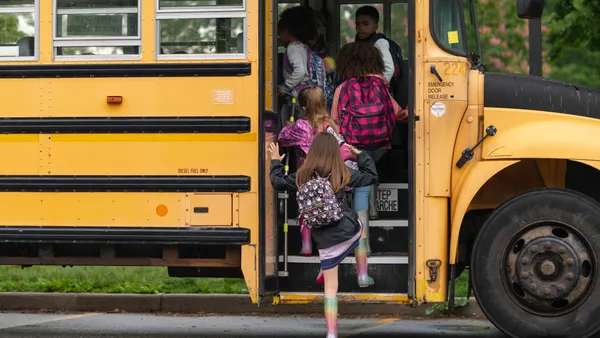Dive Brief:
-
Superintendents were more than twice as likely to report frequent job-related stress than other working adults in spring 2023, according to a limited but nationally representative survey of 150 superintendents released Wednesday by RAND Corp. Nearly 80% of superintendents said work is often or always stressful, compared to 33% of other working adults.
-
The survey found "the intrusion of political issues and opinions into schooling" to be the most commonly cited source of stress for superintendents, regardless of their experience, gender, race or district type.
-
However, superintendents of color and superintendents in suburban districts were especially likely to cite politics as a stressor, at nearly 100%, compared to 88% of superintendents overall. Those who cited political issues as a source of stress also reported more frequent stress on average than those who did not cite political issues.
Dive Insight:
Overall, half of all superintendents surveyed by RAND said they were coping "well or very well" with their stress.
Superintendents of color were more likely than their White counterparts to say politics was a source of stress. Still, 83% of superintendents of color reported they were coping "well or very well" with that stress, compared to only 45% of White superintendents who said the same.
The survey, which was fielded in spring 2023, did not define which political issues stressed superintendents. That was intentional, researchers said, because "we wanted to capture any type of divisive topic that a superintendent and his or her district may face."
"Superintendents may have been thinking about issues that have played out nationally, such as disagreements over discussions of gender and sexuality or critical race theory in classrooms, book bans, or COVID-19 safety protocols," researchers wrote. Other issues could be local, like superintendents' relationships with city and state leaders, they said.
While the researchers considered the survey to "be suggestive rather than definitive," other research has arrived at similar results.
A nationally representative RAND report from 2022 showed 95% of respondents said the role of superintendent had gotten harder in the past decade. Those considering exiting the field listed job-related stress and community politics as top drivers of the decision.
A more recent report from EAB in February shows that 3 in 4 superintendents say disrespectful communication from parents is worse now than before the pandemic. In addition, a majority said they considered the influence of political groups on parents' communications and behaviors to be a moderate to major concern.
Growing political conflict as a barrier to respectful dialogue in schools and addressing misinformation was also cited in a survey of nearly 700 high school principals released last year by the Institute for Democracy, Education, and Access at the University of California, Los Angeles and the Civic Engagement Research Group at the University of California Riverside.
Another report from RAND, also released last year, showed 1 in 4 superintendents were likely to quit soon. Researchers at the time said burnout likely played a role, and that superintendents could benefit from "political cover" when making significant decisions for their districts.
Researchers in the latest RAND report, meanwhile, noted the survey results could be used to increase focus on well-being in professional development opportunities and leadership preparation programs.














